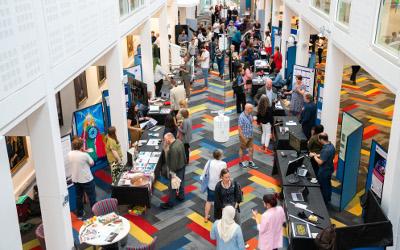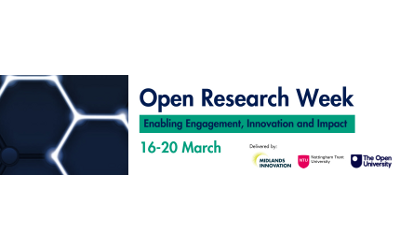New OU research platform invites collaboration on societal challenges

A new OU research platform is open for collaboration on some of the most important challenges of our time.
The Open Societal Challenges Online Platform that will enable those outside The Open University (OU) to work with our researchers on society’s most pressing issues, is launching this month (October 2023).
The Platform is based on a concept introduced by Professor Kevin Shakesheff, Pro-Vice-Chancellor (PVC) for Research & Innovation, in 2021, when a consultation led to opening up challenges to OU staff and students under the themes of Sustainability, Living Well and Tackling Inequalities.
It already hosts over 130 Open Societal Challenges (OSC) projects spanning these themes.
Some of the proposals aim to combat the climate crisis while protecting people’s rights and improving living conditions now and in the future; others propose new models for living well, and many overlap across themes as they redress inequalities across the world such as religious intolerance, gender-based violence, and unequal opportunities for people with disabilities.
Speaking at the first anniversary showcase of the OSC projects, Professor Shakesheff said:
“I’m really pleased with how this initiative has gone with this ability to bring people together to work in teams.
“We are starting to make an impact outside of the OU and are ready to draw people into the work we are doing.”
Hear more from Professor Shakesheff and from OSC Challenge leads
Kevin Shakesheff: I'm really, really pleased with how the Open Societal Challenges has gone.
This ability to bring people together and now working in teams.
Usha Modhavadia: Things that touch our environment is really the focus here.
Sam Shaw: We've made some films as part of this project and we launched them by a pedal powered cinema.
It's really important to really wrap sustainability into how we're doing things as well as kind of the theme of what we're doing.
Rachel Millar: I'm here with a project, called Take Five To Age Well.
We share the best research that's currently into behaviours that can boost people's health and wellbeing in the short term and in the long term.
Rebecca Harrison: So we are looking at the environmental impacts of filmmaking and we're specifically looking at props and costumes.
What the environmental impacts would be.
So thinking about carbon emissions attached to those making processes.
Kevin Shakesheff: It's great just to have this buzz today.
Lots of people interacting and sharing ideas and I think, you know, for the long term it just offers so many opportunities for people to find new ways of working together.
One of the themes was how to manage waste, which is just fascinating, which will have a massive impact on the environment.
And we started to make an impact outside of the OU and draw people into the work we're doing.
Jim Hague: The applications we're looking at are cultured meat.
The hope with cultured meat is to replace animals and hopefully it would open up more space for biodiversity, for nature.
Kevin Shakesheff: Everybody wants to work to do better for society.
This is it.
This is what comes out of something like this.
And I think it's great.
The OSC team is keen to work with organisations such as universities, research centres, charities, businesses, third sector organisations, policy thinktanks and councils across all four nations.
The Platform, which was designed by a team led by Professor Anna De Liddo, in the OU’s Knowledge Media Institute, makes it possible for these organisations to request involvement in the existing challenges or to submit a new one.
Commenting on the design of the new Open Societal Challenges Online Platform, Professor De Liddo said:
“It is always exciting to be part of the architects and witnesses of innovative projects where technology facilitates new organisational change.
“It took great vision on the part of our PVC, a focus on people and practices on the part of the OU's Research and Enterprise Strategy team, and the experience and commitment of our Knowledge Media Institute in delivering technological innovations with real social impact, to develop what is, without doubt, a unique digital platform for strategic research development and collaboration.
“To design the Open Societal Challenges Platform, we drew on the theories and practices of the study of Collective Intelligence in Computer Science and combined them with the Theory of Change and a careful attention to the User Experience. The main aim of the digital platform was to catalyse our research efforts at university level, engage all our researchers and students, in an open, ubiquitous and democratic way and across all our four faculties. We wanted to create a 'showcase' that would allow external collaborators to get a holistic but accurate view of the university's expertise and direction of impact. Our aim from the outset was to increase collaboration and identify synergies both internally and with other universities, founders and research partners. An ambitious and unique vision, realised with a simple digital interactive experience that could be used by everyone, more or less experienced.
“In the classic OU tradition, we have been blunt and passionate about disrupting and innovating the way we learn and collaborate, and we are proud to have once again demonstrated The Open University's ability to surprise and unite with distributed technologies.”
About the OU’s Open Societal Challenges Programme
The OU’s Open Societal Challenges Programme aims to tackle some of the most important challenges of our time through impact-driven research
The Programme's aim is to apply excellent research by OU academics to some of the most pressing challenges facing people across the UK and worldwide to transform lives and drive societal change.
The Programme’s focus on the themes of Tackling Inequalities, Living Well, and Sustainability aligns well with the OU’s mission to be open to people, places, methods and ideas.
You may also be interested in:
Contact our news team
For all out of hours enquiries, please telephone +44 (0)7901 515891
Contact detailsNews & articles

Open Research Week to spotlight innovation in 2026
Open Research Week will return from 16–20 March 2026, uniting Open University researchers and partners to explore how open practices drive engagement, innovation and societal benefit.